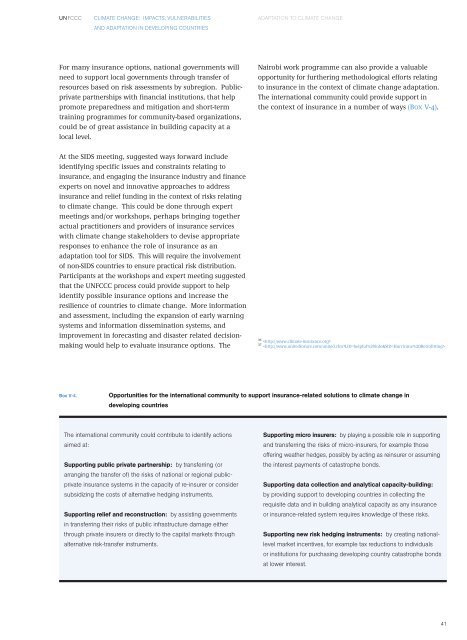impacts
You also want an ePaper? Increase the reach of your titles
YUMPU automatically turns print PDFs into web optimized ePapers that Google loves.
UNFCCC<br />
CLIMATE CHANGE: IMPACTS, VULNERABILITIES<br />
AND ADAPTATION IN DEVELOPING COUNTRIES<br />
ADAPTATION TO CLIMATE CHANGE<br />
For many insurance options, national governments will<br />
need to support local governments through transfer of<br />
resources based on risk assessments by subregion. Publicprivate<br />
partnerships with financial institutions, that help<br />
promote preparedness and mitigation and short-term<br />
training programmes for community-based organizations,<br />
could be of great assistance in building capacity at a<br />
local level.<br />
Nairobi work programme can also provide a valuable<br />
opportunity for furthering methodological efforts relating<br />
to insurance in the context of climate change adaptation.<br />
The international community could provide support in<br />
the context of insurance in a number of ways (Box V-4).<br />
At the SIDS meeting, suggested ways forward include<br />
identifying specific issues and constraints relating to<br />
insurance, and engaging the insurance industry and finance<br />
experts on novel and innovative approaches to address<br />
insurance and relief funding in the context of risks relating<br />
to climate change. This could be done through expert<br />
meetings and/or workshops, perhaps bringing together<br />
actual practitioners and providers of insurance services<br />
with climate change stakeholders to devise appropriate<br />
responses to enhance the role of insurance as an<br />
adaptation tool for SIDS. This will require the involvement<br />
of non-SIDS countries to ensure practical risk distribution.<br />
Participants at the workshops and expert meeting suggested<br />
that the UNFCCC process could provide support to help<br />
identify possible insurance options and increase the<br />
resilience of countries to climate change. More information<br />
and assessment, including the expansion of early warning<br />
systems and information dissemination systems, and<br />
improvement in forecasting and disaster related decisionmaking<br />
would help to evaluate insurance options. The<br />
36 <br />
37 <br />
Box V-4.<br />
Opportunities for the international community to support insurance-related solutions to climate change in<br />
developing countries<br />
The international community could contribute to identify actions<br />
aimed at:<br />
Supporting public private partnership: by transferring (or<br />
arranging the transfer of) the risks of national or regional publicprivate<br />
insurance systems in the capacity of re-insurer or consider<br />
subsidizing the costs of alternative hedging instruments.<br />
Supporting relief and reconstruction: by assisting governments<br />
in transferring their risks of public infrastructure damage either<br />
through private insurers or directly to the capital markets through<br />
alternative risk-transfer instruments.<br />
Supporting micro insurers: by playing a possible role in supporting<br />
and transferring the risks of micro-insurers, for example those<br />
offering weather hedges, possibly by acting as reinsurer or assuming<br />
the interest payments of catastrophe bonds.<br />
Supporting data collection and analytical capacity-building:<br />
by providing support to developing countries in collecting the<br />
requisite data and in building analytical capacity as any insurance<br />
or insurance-related system requires knowledge of these risks.<br />
Supporting new risk hedging instruments: by creating nationallevel<br />
market incentives, for example tax reductions to individuals<br />
or institutions for purchasing developing country catastrophe bonds<br />
at lower interest.<br />
41


